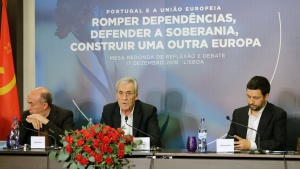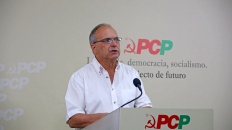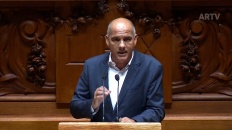I would like to thank all the guests who accepted our invitation to share with us valuable contributions to PCP’s reflection and proposal.
This reflection and the mobilisation of wills to open new avenues for Portugal and for Europe is all the more important when the general framework is that of a growing and almost absolute unsustainability of the situation brought about by the capitalist integration process of the European Union and the policies and ideological matrix that characterises it.
Economic stagnation, increasing asymmetries and dangers of a new crisis; regression and social crisis; continued attacks on democracy and sovereignty; militaristic drift and insecurity, with the so-called European army; policies contrary to the most elementary human rights, such as the case of refugees; growth of the far right and of reactionary and fascist ideologies - these are some of the features of the current situation in the European Union which place the need and urgency for a genuine, serious and global questioning of policies, which at national and supranational level are at the root of serious problems affecting the peoples of Europe.
At the national level, if it is true that the situation in Portugal has developed positively in the last three years, with advances and achievements that cannot be underestimated - especially if considered in a broader context of the fundamental trends in Europe and the world - it is also true that Portugal remains an unequal, impoverished and dependent country, which is confronted with many serious problems, deficits and structural needs that need to be answered.
While it is true that some achievements were made against the guidelines of the EU, it is also true that the policies of the European Union and the right-wing policy that support and endorse them are preventing us from affirming a genuine national project of development and to go further and give a decisive response to numerous social problems that continue to affect a significant part of the Portuguese population.
The diagnoses are made, and several of them have been reaffirmed today. It is clear that the policies of the Euro and the European Union do not provide answers to the main problems that today affect almost all the European states and peoples, including Portugal. The contradiction between such policies and the rights of peoples is at the heart of growing popular protest, political instability and events such as the exit of the United Kingdom from the European Union.
Portugal is not immune to such fundamental trends, and is not a particular case as has already been stated. As it was once again made clear during last week's European Council, the response needed to bring about real change at national and European level will come neither from the European institutions nor from the governments which in the Council insist on the deepening of the European Union and the Euro. This is a false answer to the equally false dilemma between nationalism and a project of European Union exhausted and contrary to the interests of the peoples.
Instead, the answer lies in the ability of peoples to break the chains of dependence on which this supranational European Union project of economic and political domination of an imperialist nature is based. It necessarily calls for the exercise of national sovereignty as a fundamental element to change the existing correlation of forces in a progressive direction. Abdicating this core axis of struggle and insisting on the neoliberal, militaristic and federalist prescription is to open up more scope for nationalism and the far right.
It is from this reflection that the PCP proposes to the Portuguese people a break and a patriotic and left-wing alternative. Patriotic, because it is based on the exercise of sovereignty to defend the national interest and to endow the country with the necessary instruments for its development. Left-wing, because real development is inseparable from social progress and because the true national interest is the interest of the workers and the people, with their rights and aspirations for a better life and a fairer Portugal.
The patriotic and left-wing policy that we defend and is urgent to implement is based on the valorisation of work and workers by increasing their wages, the right to employment, job stability and security.
This involves a break with national and European Union policies that impose low wages, institutionalise precariousness, defend labour deregulation as something modern and enhance the inequalities in the redistribution of the created wealth.
The patriotic and left-wing policy entails a determined commitment to the promotion of national production and its diversification, with central objectives being full employment, substitution of imports, support to micro, small and medium-size enterprises, reindustrialisation of the country and development of sectors like agriculture and fisheries.
This means a break with decades of a right-wing policy of disinvestment in the national productive apparatus. It implies breaking with the privatisation policy, as well as with the other policies associated with the Euro and the Single Market, which are based on a model of tertiarization, finantialization and dependence of the Portuguese economy. It also implies a break with the logic of the Common Agricultural Policy and the Common Fisheries Policy, the results of which are clearly visible in our food deficit.
The patriotic and left-wing policy advocates the use of the set of economic, budgetary and monetary instruments and policies in a sovereign manner and according to the needs of the country. This implies ruptures with the impositions of the Euro and the Economic and Monetary Union, implies the refusal of the Budgetary Treaty and the Stability Pact, and a firm decision to renegotiate the debt according to the national interest, which the European Union refuses, tries to forbid or manipulate in the interest of financial capital.
The patriotic and left-wing policy entails the recovery of the democratic and political control of the development process by the State, in particular through a State Business Sector that ensures the defence of national sovereignty in fundamental and strategic levers of the economy, such as energy, telecommunications, transport, banking and insurance.
This implies a break with key principles and policies contained in the European Union Treaty (Treaty of Lisbon), with various Single Market instruments and rules aimed at privatisation (the so-called liberalisation) and monopolist concentration on a supranational scale of various strategic sectors and instruments such as the Banking Union, which seeks to withdraw sovereign control over the banking sector from the Member States and promote a banking concentration in the European Union.
The patriotic and left-wing policy assumes as a priority the defence and strengthening of social rights, with an advanced system of social rights and a public and universal Social Security system. It also upholds investment in quality public services capable of ensuring the rights to healthcare, education, social protection, housing, culture, transport, under conditions of equality and dignity.
This implies a break with policies of disinvestment and privatisation of public services. It implies refusing the logic contained in the guidelines and directives of the European Union. The patriotic and left-wing policy is committed to the defence of the environment and territorial planning, promoting effective regional development, based on the rational use of resources, a judicious policy of public investment and other policies, aiming at a greater territorial balance and economic and social cohesion of the various regions.
This implies a break with the logic of the successive multiannual financial frameworks of the European Union which, like the one currently under discussion, are determined not by the interest of cohesion and combating of inequalities and asymmetries, but increasingly by the financing of large monopolies and projects such as the militarisation of the European Union. It also implies a break with the growing privatisation of the environmental issues, which are financed in millions by the European Union, which from a just and increasingly urgent cause is moving towards a huge multinational business of the sector.
The patriotic and left-wing policy entails an effective subordination of the economic power to the political power, eliminating the root cause of corruption and other crimes.
This implies breaking with the dominant policies in the European Union, which are largely determined by the large European multinationals and employers' federations.
The patriotic and left-wing policy implies national control of all sovereign instruments in the areas of internal security, national defence and foreign policy. Not in an unrestrained perspective, but as a condition for Portugal to assure interests, security, territorial integrity and national independence, and at the same time, freely and sovereignly, open the door to another framework of international relations, namely in the European continent .
This implies a rupture with the European Union's foreign and security policy, which, as is now evident, is based on a growing imperialist vision of the continent and the world, increasingly more muscular, with a militaristic, neo-colonial and interventionist option subordinated to NATO, an increasingly aggressive political-military bloc.
As we have tried to show, the patriotic and left-wing policy is a fundamental contribution not only to advance the country, but also, due to the reality and the results that it can achieve, that the current course of Europe is not an inevitability and that other paths are possible . Combating the inevitability of a Europe plunged into economic and social crisis, civilizational regression, political degradation and a logic of an armed imperialist fortress, nowadays entails refusing theories of reform of its essential policies and pillars, but also the defence of national sovereignty and independence as essential elements of the exercise by the people of the right to decide their own destiny.
The patriotic and left-wing policy that the PCP proposes to the people and the country has, as we have tried to prove, a national dimension. But it is simultaneously an internationalist policy because it aims to create real bases in Portugal to move the struggle for another Europe.
Just as at the national level, the essential condition for Portugal to move forward is the rupture with right-wing policy, and another Europe of workers and peoples has to be born and operate a rupture with the current process of capitalist integration. The PCP believes that building a patriotic and left-wing alternative in Portugal is the best and safest contribution to building a Europe of workers and peoples, of social progress, justice, solidarity, peace and cooperation between states that are sovereign and equal in rights. The PCP believes that this alternative policy and this political alternative will only be possible with the development of the struggle, the strengthening of the PCP and the convergence of all democrats interested in this project of rupture, construction and hope.
Without claiming to draw conclusions, we consider that these are only reflections that we put to your consideration for further discussions, actions and struggles that we want and are able to wage together.
But in ending, allow me to prevaricate in the initial commitment and draw a conclusion from our debate which I believe has run through all of today's interventions:
This conclusion is that of confidence and hope. There are solutions. There is an alternative!
Confidence and hope that we wish will change into action and struggle for a path of economic development, social progress, democracy and sovereignty for Portugal. Confidence and hope that by breaking dependencies and defending sovereignty it is possible, and increasingly more urgent, to build in Europe a course different and opposite to the current one.
A course where real cooperation and solidarity between states that are sovereign and equal in rights gives way to rights, development, democracy and peace, and enhances the mutually advantageous and truly solidary relationship between nations and free peoples.








